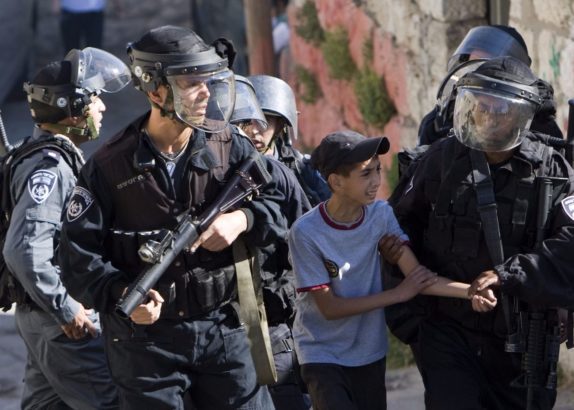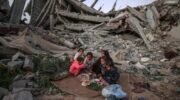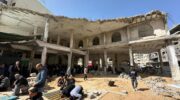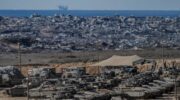Data compiled by Defence for Children International-Palestine show that Israel’s use of administrative detention – imprisoning people without charge or trial – against minors quadrupled since last year.
By Fayha’ Shalash, reposted from The Electronic Intifada, 16 January 2025
The Sahweil family are still in a state of shock months after their home was raided by Israeli troops.
In August, they found themselves surrounded by military vehicles. Dozens of soldiers invaded the home, demanding to see Ammar Sahweil, who is only 14.
Once they found Ammar, the Israeli soldiers handcuffed and blindfolded him, informing him that he was under arrest. The soldiers also beat Ammar before his parents and siblings.
“We never expected all this intrusion,” Subhi Sahweil – Ammar’s father – said.
The Israelis took Ammar away from the family’s home in the occupied West Bank village of Abwein.
One week later, the family learned that Ammar had been placed in administrative detention – imprisonment without charge or trial. He remains imprisoned.
All files against people subject to administrative detention are kept secret. Lawyers representing detainees are, therefore, unable to see those files.
The number of children held in administrative detention rose from six in early 2023 to 85 in September 2024. Data compiled by Defence for Children International-Palestine show that Israel’s use of administrative detention against minors reached a record level over recent months.
“Arbitrary and tyrannical”
Ayed Abu Eqtaish from DCI-Palestine noted that administrative detention orders are issued by a military authority. Israel’s military court system in the West Bank, he said, is “arbitrary and tyrannical.”
While Israel allows judicial reviews of detention orders from military commanders, “in more than 99 percent of cases, administrative detention orders are confirmed,” Abu Eqtaish said.
The increase in administrative detention has taken place at a time when Israel – following an agenda set by Itamar Ben-Gvir, the far-right national security minister – has made conditions harsher for Palestinian prisoners.
Mawid al-Hajj from the West Bank city of Jericho had been placed in administrative detention during May 2023. He was then among the prisoners released as part of an agreement that briefly paused Israel’s genocidal war against Gaza in late November that year.
In February 2024, Mawid was once again arrested and placed in administrative detention by Israeli forces. He was 17 at that time.
Mawid had been shot in the leg by Israeli soldiers during confrontations with Palestinian youths a few weeks before his arrest in May 2023. He was arrested after the forces of occupation summoned him for interrogation.
“I didn’t expect [the questioning] would end with his arrest because he was wounded,” said Amal, Mawid’s mother.
Mawid told his family that he had been subjected to electric shocks following his arrest.
He continued to have leg and back pain – effects of being shot and tortured – when he was again jailed in February 2024. The administrative detention order issued against him was renewed six months later.
When she learned that Mawid had been detained last year, “my heart broke,” Amal, his mother, said.
“His education has been disrupted and his health is declining,” Amal said. “And they still want to keep him in prison without charge.”
Laith Kmeil was arrested by Israeli forces during November 2023. The Israelis destroyed his family’s furniture as they stormed their home.
Both Laith and his friend Ahmad Assaf were beaten by Israeli soldiers and arrested.
According to Laith’s uncle Mujahid, the Palestinian Authority – which carries out “security coordination” with Israel – had called Laith into questioning before he was arrested. The PA had pressured him into signing a pledge that he would not confront Israel’s forces of occupation.
Two days later, Israel arrested him.
Laith, now aged 17, is being held under administrative detention in Israel’s Megiddo prison. A lawyer has only been permitted to visit him there once.
The lack of information about Laith is adding to his family’s anguish. “We don’t know anything about him,” said Mujahid, his uncle, “except that he is in the section for children in Megiddo prison.”
Fayha’ Shalash is a journalist based in the occupied West Bank.
RELATED:





